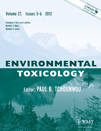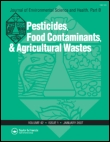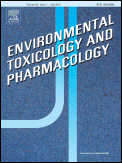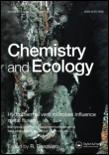
Environmental Chemistry and Ecotoxicology
Scope & Guideline
Transforming environmental science through open access.
Introduction
Aims and Scopes
- Environmental Pollutants and Their Effects:
The journal covers a wide range of environmental pollutants, including heavy metals, pesticides, and microplastics, and examines their toxicological effects on aquatic and terrestrial organisms. - Bioremediation and Sustainable Practices:
Research on bioremediation techniques, including microbial and phytoremediation, is a core focus, emphasizing sustainable methods for mitigating pollution and restoring contaminated environments. - Human Health Impact Assessments:
The journal frequently publishes studies assessing the health risks associated with exposure to environmental toxins, reflecting a commitment to understanding the implications of pollution on public health. - Innovative Analytical Techniques:
It features advancements in analytical methodologies for detecting and quantifying contaminants in various environmental matrices, which are crucial for effective monitoring and regulation. - Interdisciplinary Approaches:
The journal encourages interdisciplinary research that integrates environmental chemistry, toxicology, ecology, and public health, fostering comprehensive solutions to environmental challenges.
Trending and Emerging
- Microplastics and Human Health:
There is an increasing focus on the implications of microplastic pollution on human health, emphasizing the need for research that links environmental contamination with public health outcomes. - Nanomaterials in Environmental Remediation:
The application of nanomaterials for environmental remediation is gaining traction, highlighting their potential for effective pollutant removal and degradation, which aligns with sustainable practices. - Emerging Contaminants and Their Toxicity:
Research on emerging contaminants, such as pharmaceuticals and personal care products, is trending, reflecting growing concerns about their ecological and health impacts. - Climate Change and Pollution Interactions:
Studies exploring the intersection of climate change and environmental pollution are on the rise, focusing on how changing environmental conditions affect pollutant behavior and toxicity. - Innovative Wastewater Treatment Technologies:
There is a trend towards exploring novel wastewater treatment technologies, including biochar and green synthesis methods, that offer sustainable solutions for water quality management.
Declining or Waning
- Traditional Chemical Analysis Methods:
There has been a noticeable decline in studies utilizing conventional chemical analysis methods, as newer, more advanced techniques are being preferred for their sensitivity and efficiency. - Localized Case Studies:
Research focusing solely on localized case studies without broader implications or interdisciplinary connections has decreased, as the journal favors studies with wider applicability and relevance. - General Reviews without Novel Insights:
The publication of general review articles that do not provide new insights or perspectives has waned, indicating a shift towards more original research that contributes novel findings to the field.
Similar Journals

Toxics is a leading international journal published by MDPI that has been dedicated to advancing the knowledge in the fields of toxicology, environmental health, and chemical safety since its inception in 2013. With an impressive Open Access model, it ensures that all research findings are readily available to a global audience, fostering collaboration and innovation across academia and industry. The journal is esteemed for its rigorous peer-review process and holds notable rankings, including Q1 status in Chemical Health and Safety and Q2 in both Health, Toxicology and Mutagenesis and Toxicology, reflecting its impact on critical research areas. Based in Basel, Switzerland, Toxics provides a platform for researchers, professionals, and students to disseminate significant findings on the implications of toxic substances in health and the environment, aiming to improve public health outcomes and inform regulatory decisions. With its ongoing commitment to high-quality research and relevant access options, Toxics continues to be an essential resource in the domain of toxicology and environmental sciences.

Chemosphere
Fostering interdisciplinary insights for a healthier planet.Chemosphere is a prestigious peer-reviewed journal published by PERGAMON-ELSEVIER SCIENCE LTD, focusing on a wide array of critical topics in the fields of Chemistry, Environmental Science, and Public Health. Since its inception in 1972, the journal has become a vital platform for disseminating groundbreaking research, consistently ranking in the Q1 quartile across multiple categories, including Environmental Chemistry, Health, Toxicology and Mutagenesis, and Pollution. Its esteemed position is underlined by its impressive Scopus rankings, with significant placement in leading subsectors such as Environmental Science and Medicine. Although Chemosphere currently does not offer Open Access options, it remains a valuable resource for researchers and professionals seeking to advance their understanding of chemical interactions and their environmental impacts. The journal serves as an essential asset for students and academics alike, parsing complex issues of pollution, health, and toxicology while fostering inter-disciplinary approaches to remedy global challenges in environmental sustainability.

Revista Internacional de Contaminacion Ambiental
Connecting Research with Real-World Environmental SolutionsWelcome to the Revista Internacional de Contaminación Ambiental, a reputable journal dedicated to the field of environmental science, specifically focusing on pollution and waste management. Published by CENTRO CIENCIAS ATMOSFERA UNAM in Mexico, this journal has been a vital platform for scientific discourse since its inception in 1996 and continues to thrive as it converges into 2024. The journal holds a position in Quartile 4 for both Pollution and Waste Management in the 2023 rankings, as well as a Scopus rank in the environmental sciences category, reflecting its commitment to addressing urgent environmental issues. Although not an open-access publication, its meticulous contributions are crucial for researchers, professionals, and students alike, offering insights into pressing environmental challenges and innovative solutions. The Revista Internacional de Contaminación Ambiental is an essential resource for anyone engaged in the study and application of environmental protection and sustainable waste management.

ENVIRONMENTAL TOXICOLOGY
Illuminating the Path to Safer EcosystemsENVIRONMENTAL TOXICOLOGY, published by Wiley, is a premier academic journal dedicated to the multifaceted study of toxic substances in the environment and their effects on human health and ecosystems. With the ISSN 1520-4081 and E-ISSN 1522-7278, this journal holds a prestigious position in the field, being ranked in the Q1 category across various relevant disciplines, including Health, Toxicology and Mutagenesis, and Management, Monitoring, Policy and Law. The journal regularly publishes high-quality research articles, reviews, and policy discussions aimed at understanding the implications of environmental toxins from 1980 to the present, contributing to the body of knowledge critical for the safety and sustainability of our environment. Researchers and professionals will find a treasure trove of information that not only highlights current trends and methodologies but also sets the stage for future advancements in toxicology. As a key resource, it provides valuable insights necessary for policy-making, environmental management, and public health, reinforcing its significance in the ever-evolving fields of toxicology and environmental science.

JOURNAL OF ENVIRONMENTAL SCIENCE AND HEALTH PART B-PESTICIDES FOOD CONTAMINANTS AND AGRICULTURAL WASTES
Innovating solutions to combat agricultural waste and contaminants.JOURNAL OF ENVIRONMENTAL SCIENCE AND HEALTH PART B-PESTICIDES FOOD CONTAMINANTS AND AGRICULTURAL WASTES, published by Taylor & Francis Inc, stands as a crucial platform for advancing knowledge in the intersection of environmental science, food safety, and agricultural practices. With an ISSN of 0360-1234 and E-ISSN 1532-4109, this journal has been disseminating significant research since 1976 and continues its invaluable contributions through 2024. Recognized in notable quartiles such as Q2 in Food Science and Q3 in both Medicine and Pollution, it reflects a robust academic stature, ranking in the top half of Scopus categories, specifically in Agricultural and Biological Sciences at rank #158/389 and Environmental Science at rank #82/167. This makes it an essential resource for researchers, professionals, and students who are focused on understanding and mitigating the impacts of pesticides, food contaminants, and agricultural waste. Although it is not an open access journal, the depth and quality of its published work offer a wealth of information for those striving to innovate in sustainable practices and public health safety. Engage with the latest findings and discussions that shape the future of environmental health and food science.

ARCHIVES OF ENVIRONMENTAL CONTAMINATION AND TOXICOLOGY
Championing high-quality research for environmental safety.ARCHIVES OF ENVIRONMENTAL CONTAMINATION AND TOXICOLOGY, published by Springer, stands as a leading journal in the field of environmental health and toxicology. With an impressive impact factor, it maintains its stature in the Q1 category for Health, Toxicology and Mutagenesis, Medicine (miscellaneous), and Pollution as of 2023. Since its inception in 1973, this journal has been a crucial platform for disseminating high-quality research that addresses environmental contaminants and their implications on human health and ecosystems. The journal welcomes original articles, review papers, and discussions that deepen our understanding of exposure assessment, bioaccumulation, and toxicological effects of pollutants. While it is not an open-access publication, its commitment to rigorous peer-review ensures that every piece published contributes significantly to the ongoing dialogue within the scientific community. Researchers, professionals, and students engaged in environmental science, toxicology, and public health will find the findings shared in this journal invaluable to their work.

Pollution
Connecting researchers to tackle pressing environmental issues.Pollution is a distinguished open-access journal published by UNIV TEHRAN, dedicated to advancing the understanding of environmental science and the multifaceted aspects of pollution research. Since its establishment in 2015, the journal has been committed to disseminating high-quality, peer-reviewed articles that address the pressing issues of environmental degradation globally. With an impact factor and a Scopus rank that places it within the top tier of Environmental Science (Rank #141/233), Pollution serves as an essential resource for researchers, professionals, and students alike. The journal encompasses a wide range of topics, including the sources, effects, and mitigation strategies related to various forms of pollution, thereby aiming to contribute significantly to the scientific community's efforts in promoting environmental sustainability. Its innovative and timely approach positions Pollution as a vital platform for sharing knowledge and fostering interdisciplinary collaboration in the environmental science domain.

Environmental Toxicology and Pharmacology
Bridging the gap between toxicology and pharmacology.Environmental Toxicology and Pharmacology, published by Elsevier, is a leading journal dedicated to advancing our understanding of the effects of environmental pollutants on biological systems. With an ISSN of 1382-6689 and an E-ISSN of 1872-7077, this journal covers a wide range of studies related to toxicology, pharmacology, and environmental health. The journal is classified as Q2 in key categories such as Health, Toxicology and Mutagenesis and Medicine (miscellaneous), and sits impressively in Q1 for Toxicology, reflecting its strong impact in the field. As of 2023, it ranks #30 out of 133 in Toxicology and #40 out of 148 in Health, indicating its high relevance and contribution to research. While the journal is not currently open access, it remains a pivotal resource for researchers, professionals, and students seeking to explore the intricacies of environmental health effects. Its commitment to publishing high-quality peer-reviewed research positions it as a crucial platform for scientific dialogue and discovery.

CHEMISTRY AND ECOLOGY
Illuminating the Chemistry Behind Ecological SystemsCHEMISTRY AND ECOLOGY is a prestigious academic journal published by TAYLOR & FRANCIS LTD, dedicated to advancing the interdisciplinary understanding of chemical processes in ecological systems. With an ISSN of 0275-7540 and an E-ISSN of 1029-0370, this journal has been a significant contributor to the fields of Earth and Planetary Sciences, Ecology, and Environmental Science since its inception in 1982. The journal is proudly ranked in the second quartile (Q2) in multiple categories, including Earth and Planetary Sciences and Ecology, reflecting its high impact within these disciplines. Despite not being an open-access publication, it provides valuable insights through rigorous peer-reviewed articles that explore the intricate relationships between chemical phenomena and ecological dynamics. Researchers, professionals, and students can rely on CHEMISTRY AND ECOLOGY for the latest findings and methodologies that drive innovation and understanding in environmental chemistry and ecology, enhancing their work and education in this critical area of study.

BULLETIN OF ENVIRONMENTAL CONTAMINATION AND TOXICOLOGY
Unveiling the impacts of toxins on ecosystems and society.BULLETIN OF ENVIRONMENTAL CONTAMINATION AND TOXICOLOGY, published by SPRINGER, is a pivotal journal in the fields of Environmental Science, Toxicology, and Public Health. With a strong history of dissemination since its inception in 1966, the journal predominantly focuses on the latest advances in understanding environmental contaminants and their toxicological effects on health and ecosystems. It currently holds a respectable Q2 ranking across multiple categories including Health, Toxicology and Mutagenesis, Medicine (miscellaneous), and Pollution, as per the 2023 metrics. While the journal is not Open Access, it provides an invaluable platform for researchers, professionals, and students seeking to contribute to and stay informed on critical issues regarding environmental hazards and their implications. With an engaged community of scholars and practitioners, this journal continues to be an essential resource for addressing the pressing challenges of environmental contamination and its health impacts, guiding future research and policy decisions.